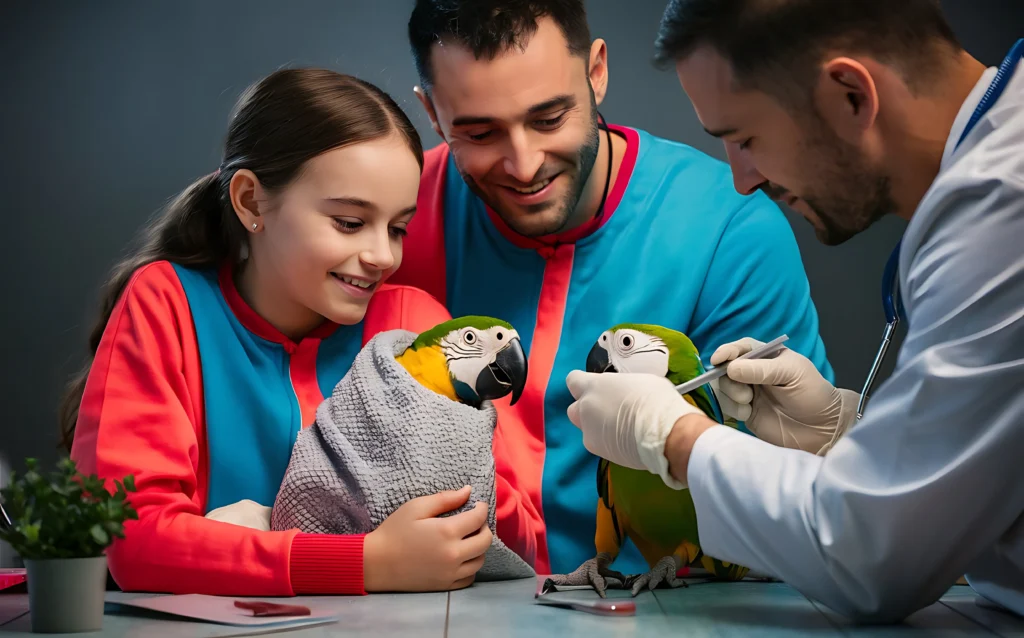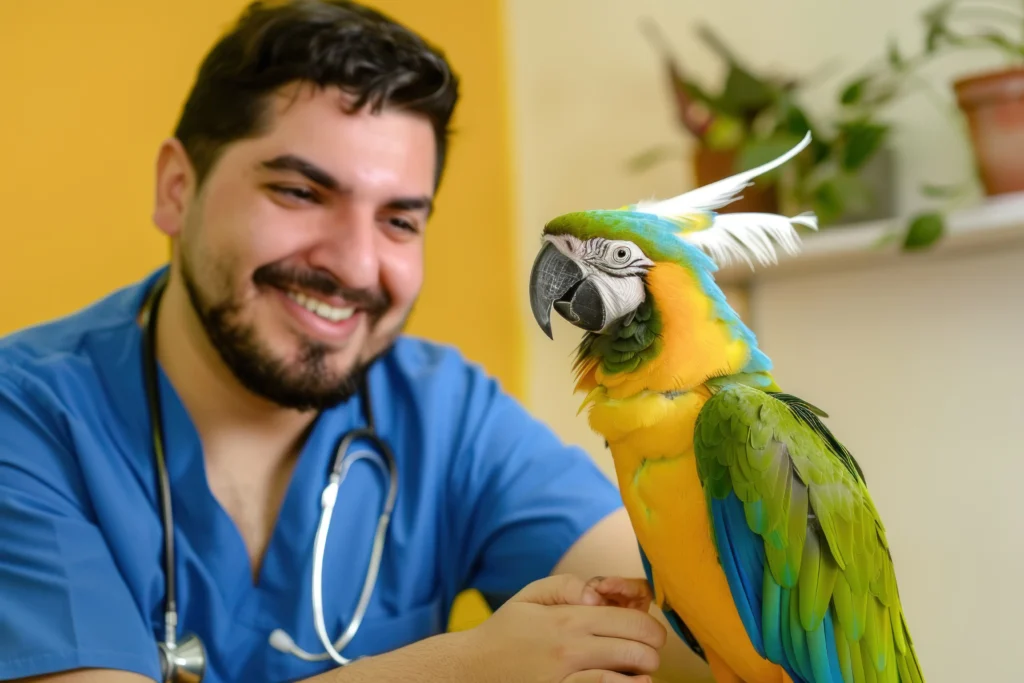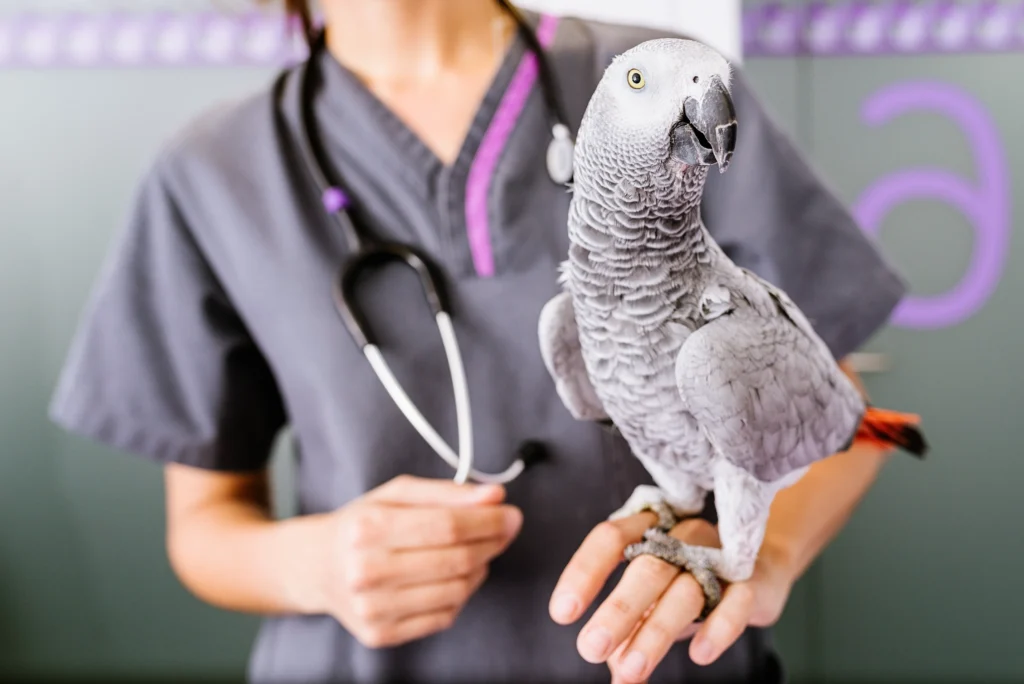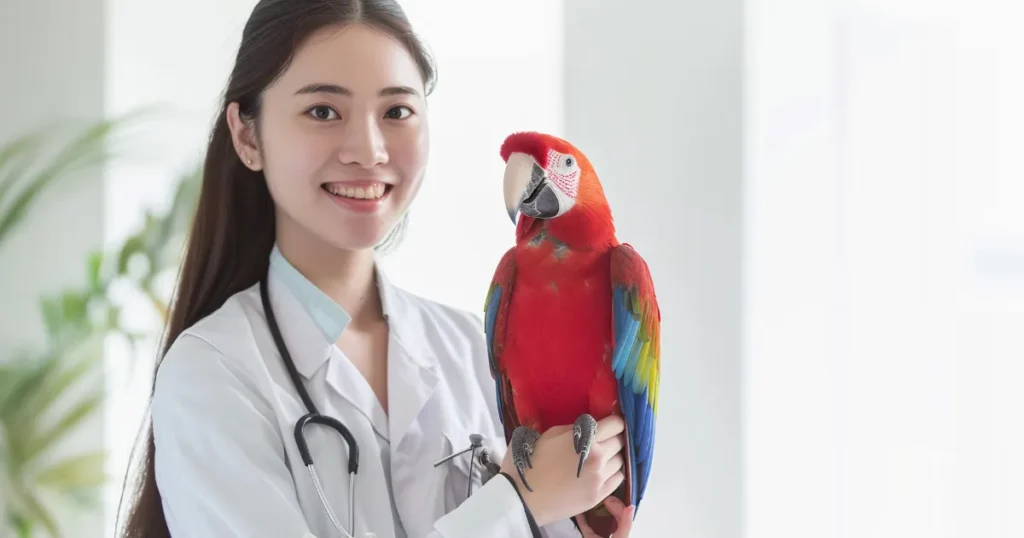Caring for a macaw needs special knowledge about their health challenges. It’s key for responsible pet owners. This guide will help you understand macaw medical care and disease prevention.
Macaws are stunning, smart birds that need expert health care. Learning about their health issues can greatly improve your bird’s life. Nutrition and environment are crucial for their well-being.
Vets say early action is best for macaw health. Spotting signs early and using preventive steps can prevent big health problems. With the right knowledge, you can keep your macaw healthy for a long time.
Key Takeaways
- Early detection is critical in macaw health management
- Preventive care reduces risk of serious medical conditions
- Regular veterinary check-ups are essential
- Proper nutrition supports overall macaw health
- Environmental factors significantly impact bird wellness
Understanding Common Macaw Healthcare Issues
Keeping your macaw healthy means watching closely and acting fast. Spotting illness signs early can greatly improve your bird’s health and treatment results.
Start with macaw health tips by noticing small changes that could mean trouble. Since birds can’t talk, you must learn to spot physical and behavioral signs of illness.
Physical Signs of Illness in Macaws
Watch for these key physical signs of illness in your macaw:
- Unusual feather appearance or loss
- Changes in beak color or texture
- Discharge from eyes or nostrils
- Significant weight fluctuations
- Discolored or abnormal droppings
Behavioral Changes That Indicate Health Problems
Look for these behavioral changes to know if your macaw is sick:
- Reduced vocalization or unusual quietness
- Decreased appetite
- Lethargy or reduced activity levels
- Increased aggression or irritability
- Changes in sleeping patterns
Emergency Symptoms to Watch For
Some symptoms need quick vet care. If you see these signs, call an avian vet right away:
- Labored breathing
- Extreme weakness
- Continuous vomiting
- Seizures or tremors
- Bleeding
“Early detection is the key to preventing serious health problems in macaws.” – Avian Health Expert
Prevention is always better than cure. Regular vet visits and careful care can catch health issues early.

Essential Preventive Care for Your Macaw’s Health
Keeping your macaw healthy needs a full plan for preventive care. Getting advice from your vet is key to keeping your bird well and avoiding health problems.
Understanding your macaw’s health needs is the first step. Regular vet visits help catch issues early and keep your bird in top shape.
- Schedule annual comprehensive health examinations
- Conduct regular weight and physical assessments
- Monitor nutritional intake and dietary requirements
To stop respiratory infections in macaws, follow some important steps. Keep their area clean, ensure good air flow, and avoid drafts. These actions help protect your bird’s breathing.
For a healthy diet, choose a balanced mix. Experts say:
- High-quality pellet diet as the primary food source
- Fresh fruits and vegetables for extra nutrients
- Limited seeds and treats
- Consistent fresh water supply
Expert avian vets say mental play and exercise are vital. They help keep your macaw healthy and prevent medical issues.
Being proactive is crucial for your macaw’s long, healthy life. By following these steps, you can lower health risks and keep your bird lively and joyful.
Respiratory Infections: Symptoms and Treatment Options
Respiratory infections can be a serious threat to your macaw’s health. These conditions range from mild breathing difficulties to severe systemic infections that require immediate veterinary attention. Understanding the signs, causes, and treatment of macaw respiratory infections is crucial for protecting your feathered companion.
Macaws are particularly susceptible to various respiratory challenges that can quickly compromise their delicate respiratory systems. Psittacosis in macaws, a potentially dangerous bacterial infection, ranks among the most concerning respiratory threats for bird owners.
Common Causes of Respiratory Issues
Respiratory problems in macaws can stem from multiple sources:
- Bacterial infections
- Viral pathogens
- Fungal contaminations
- Environmental irritants
- Stress-related immune system weakness
Treatment Protocols for Breathing Problems
When addressing how to cure bacterial infections in macaws, veterinarians typically recommend:
- Comprehensive diagnostic testing
- Targeted antibiotic treatments
- Supportive care and nutrition
- Isolation to prevent potential spread
- Close monitoring of respiratory function
Prevention Strategies for Respiratory Health
Protecting your macaw from respiratory infections involves proactive management:
- Maintain clean, well-ventilated living spaces
- Minimize exposure to potential pathogens
- Provide balanced nutrition
- Regular veterinary check-ups
- Reduce environmental stressors
Early detection and prompt intervention are key to managing respiratory infections in macaws. Always consult an avian veterinarian if you notice any breathing difficulties or unusual symptoms.
Nutritional Requirements and Dietary Concerns
Keeping your macaw healthy means giving them the right food. Vitamin deficiencies can cause big problems. It’s important to know what to feed them to avoid diseases.
A good diet for macaws has many nutrients. Here are the main ones:
- High-quality pellets (50-70% of diet)
- Fresh fruits and vegetables
- Limited seed mixtures
- Clean, fresh water daily
Choosing the right supplements is also key. Calcium, vitamin A, and vitamin D3 help keep them healthy. They boost the immune system and fight off diseases.
Look out for these signs of bad nutrition:
- Feather discoloration
- Weakened immune response
- Reduced energy levels
- Abnormal beak or feather growth
Talking to an avian vet is a good idea. They can make a diet plan just for your macaw. This helps avoid health problems.

Beak and Feather Disease: Recognition and Management
Macaw owners need to watch out for Psittacine Beak and Feather Disease (PBFD). This serious virus can harm your bird’s health. Knowing the symptoms early is key to managing the disease.
The disease weakens a macaw’s immune system. It changes their feathers and beaks. Spotting early signs is vital for your bird’s health.
Early Warning Signs
Look out for these PBFD symptoms:
- Abnormal feather growth or loss
- Progressive beak overgrowth and deformities in macaws
- Discolored or brittle feathers
- Feather plucking triggered by stress
Treatment Approaches
There’s no cure, but care can help manage symptoms. Vets focus on:
- Boosting immune system function
- Preventing secondary infections
- Maintaining optimal nutrition
“Early detection is key in managing PBFD and improving your macaw’s quality of life.” – Avian Veterinary Association
Prevention Strategies
| Prevention Method | Implementation |
| Quarantine New Birds | Isolate new macaws for 30-60 days |
| Regular Veterinary Checkups | Bi-annual comprehensive health screenings |
| Stress Reduction | Maintain consistent environment and routine |
Managing feather plucking and stress in macaws is important. A stable environment, good nutrition, and regular vet visits can lower disease risks.
Proper Hygiene and Disease Prevention Strategies
Keeping your macaw’s environment clean is key to their health. Good hygiene helps prevent diseases and keeps your bird happy and healthy. Experts stress the need for regular cleaning and managing the environment.
Daily Cleaning Routines
Every day, your macaw needs a clean environment. Here’s how to keep them healthy:
- Clean food and water dishes daily with hot water and mild soap
- Remove droppings and uneaten food immediately
- Wipe down perches and cage surfaces with bird-safe disinfectant
- Replace cage liners or newspapers daily
Cage Sanitation Guidelines
Regular vet visits are important for your macaw’s health. A weekly cleaning schedule is vital:
- Perform a deep clean of the entire cage
- Disinfect all accessories and toys
- Check for any signs of wear or damage
- Ensure proper ventilation during cleaning
Environmental Health Factors
Macaws need special care, including a clean environment. Watch out for:
- Air quality: Avoid smoke, cooking fumes, and aerosol sprays
- Temperature: Maintain a consistent, comfortable room temperature
- Humidity: Keep humidity levels between 50-70%
- Lighting: Provide natural light cycles and avoid drafts
Regular vet visits are crucial for early disease detection and your macaw’s well-being.

Fungal and Bacterial Infections: Identification and Treatment
Macaws can get sick from fungal infections and bacterial diseases. It’s important to know about these health problems. This helps keep your bird healthy and avoids serious issues.
Common Types of Infections
Macaws can get different kinds of fungal infections. These infections can affect various parts of their body. The main types are:
- Aspergillosis (respiratory fungal infection)
- Candidiasis (yeast infection)
- Bacterial enteritis
Identifying Infection Symptoms
It’s key to spot infection signs early. Look out for these symptoms:
- Persistent diarrhea
- Respiratory distress
- Decreased appetite
- Unusual lethargy
- Changes in droppings
Treatment Protocols
Dealing with infections in macaws needs a detailed plan. Vets usually suggest:
| Infection Type | Treatment Method | Duration |
| Fungal Infections | Antifungal medications | 2-4 weeks |
| Bacterial Infections | Targeted antibiotics | 1-2 weeks |
Prevention Strategies
To stop infections in macaws, use these steps:
- Maintain clean living environment
- Provide balanced nutritional diet
- Reduce stress factors
- Regular veterinary check-ups
- Proper hygiene practices
Knowing about common health issues in macaws helps. Taking care of your bird early on keeps them healthy and happy.
Managing Chronic Health Conditions in Aging Macaws
As your macaw gets older, knowing how to keep it healthy is key. Aging macaws can face chronic health issues that need special care. It’s important to take your bird to the vet regularly to catch problems early.
Do macaws need special veterinary care as they age? Yes, they do. Senior macaws may deal with arthritis, less mobility, and changes in metabolism. Your vet can create a care plan for your bird’s joint health, diet, and any medical needs.
Managing chronic conditions requires a few steps. Regular vet visits, diet changes, and a stress-free home are vital. Use softer perches, lower cage heights, and gentle handling to help your bird.
By understanding and meeting your macaw’s health needs, you can make its later years better. Stay informed, work with your vet, and show love and care. This way, your bird can age comfortably and with dignity.
FAQ
What are the most common health issues in macaws?
Macaws often face health problems like respiratory infections and beak and feather disease (PBFD). They can also have nutritional deficiencies and infections. Issues like psittacosis and vitamin A deficiencies are common too.
How often should I take my macaw to the veterinarian?
Healthy macaws need annual check-ups. More visits are needed for older birds or those with health issues. Young birds should have initial health screenings. See a vet right away if you notice unusual symptoms.
What are the early signs of illness in macaws?
Look for changes in behavior like lethargy and decreased appetite. Also, watch for unusual droppings and altered vocalization. Physical signs include ruffled feathers and breathing difficulties.
How can I prevent respiratory infections in my macaw?
Keep your macaw’s living area clean and well-ventilated. Avoid drafts and manage humidity levels. Provide a balanced diet and minimize stress. Regular vet visits and good hygiene are key.
What diet helps maintain my macaw’s overall health?
Feed your macaw high-quality pellets, fresh veggies, fruits, and a few seeds. Make sure the diet is varied and includes fresh water. Consider calcium and vitamin supplements as advised by a vet.
What is beak and feather disease, and how can I prevent it?
Beak and Feather Disease (PBFD) is a viral infection causing feather loss and beak deformities. Prevent it by buying from reputable breeders and quarantining new birds. Maintain strict hygiene and minimize stress.
How do I recognize a serious health emergency in my macaw?
Look for signs like difficulty breathing and extreme lethargy. Also, watch for sudden weight loss, vomiting, diarrhea, bleeding, and seizures. If you see these, get immediate vet care.
What environmental factors impact my macaw’s health?
Important factors include a consistent temperature (65-80°F) and humidity (50-70%). Clean air, proper lighting, and minimal stress are also crucial. Ensure the cage is the right size and provides mental stimulation.
How can I manage stress in my macaw?
Provide a consistent routine and mental stimulation. Ensure enough sleep (10-12 hours daily) and a stable environment. Regular social interaction and training sessions help too.
What supplements are recommended for macaw health?
Supplements like calcium, vitamin A, vitamin D3, and probiotics are recommended. Always consult an avian vet before adding supplements to ensure they meet your macaw’s needs.
